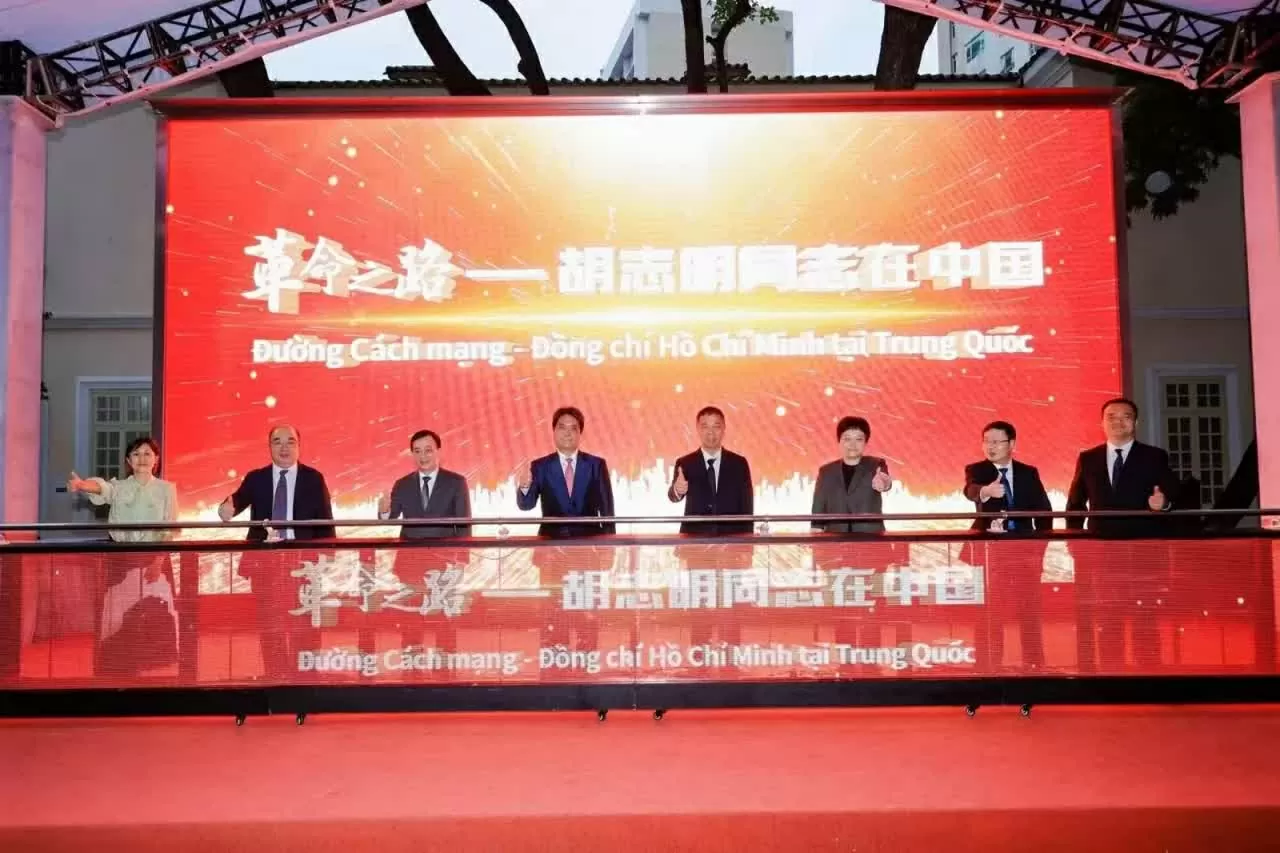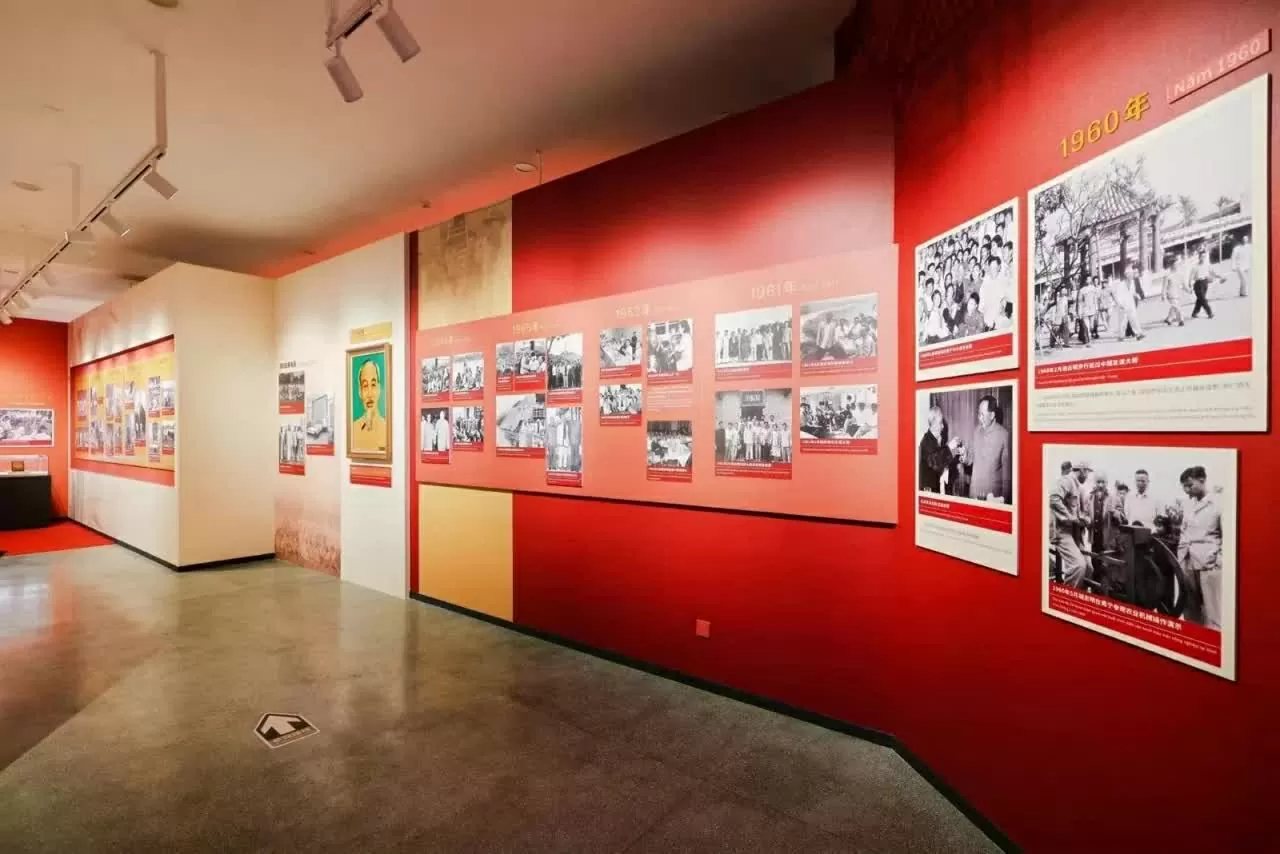
Exhibition 'Revolutionary Path: Comrade Ho Chi Minh in China' opens in Guangzhou
Latest
 |
| Consul General Nguyen Viet Dung and leaders of Guangzhow agencies and units opened the Exhibition. (Photo: WVR) |
The thematic exhibition is co-organized by the Guangdong Museum of Revolutionary History (China) and the Ho Chi Minh Museum (Vietnam), with support from the Consulate General of Vietnam in Guangzhou and coordination from various institutions, memorial houses, and museums across China. These include the Memorial House of the Eighth Route Army Office of Guilin; Museum of Wuhua District (Kunming); Museum of Hongyan Revolutionary History (Chongqing); Department of Culture, Sports, Radio, Television and Tourism of Jingxi City; Museum of the Liuzhou Army; and the Memorial House of the Eighth Route Army of the Chinese Red Army.
Attending the opening ceremony were Director of the Guangdong Museum of Revolutionary History Yi Xibing; Consul General of Vietnam in Guangzhou Nguyen Viet Dung; Director of the Ho Chi Minh Museum Vu Manh Ha; Director of the Ho Chi Minh Museum, Ho Chi Minh City Branch, Ms. Luu Thi Tuyet Trinh; Director of the Ho Chi Minh Museum, Hue City Branch, Ms. Le Thuy Chi; and leaders from multiple agencies, departments, and branches of Guangzhou city, including the Publicity Department of the Guangzhou Party Committee, the Department of Culture, Radio, Television and Tourism of Guangzhou, and the Foreign Affairs Office of Guangzhou city.
During a meeting with Mr. Liu Xiaoming, Deputy Director General of the Guangzhou Department of Culture, Radio, Television and Tourism, Consul General Nguyen Viet Dung emphasized that the exhibition is a highly meaningful event, held on the occasion of the 75th anniversary of the establishment of diplomatic relations between Vietnam and China; the Vietnam–China Year of Humanistic Exchanges 2025; and the 135th anniversary of President Ho Chi Minh’s birthday (May 19, 1890 – May 19, 2025).
He noted that the exhibition serves as a concrete step in implementing the orientation of “building a stronger social foundation” outlined in recent Joint Statements by the leaders of both countries. It also represents a timely response to the “Red Journey of Youth Research and Study” initiative launched in April 2025 by General Secretary To Lam and General Secretary and President of China Xi Jinping during the Chinese leader’s State visit to Vietnam.
The Consul General also expressed his appreciation to the leaders of Guangzhou’s departments and agencies for dedicating significant resources to restoring and upgrading Vietnamese revolutionary relic sites in the city, as well as for creating favorable conditions for Vietnamese tourists to visit these historically significant locations.
Mr. Liu Xiaoming highly appreciated the effective and practical cooperation over the years between the Guangdong Museum of Revolutionary History and the Ho Chi Minh Museum. He emphasized that through collaborative projects such as this exhibition, the peoples of the two countries—especially the younger generation—will gain a deeper understanding of the glorious history of the traditional friendship of “both comrades and brothers,” built by the revolutionary leaders and soldiers of both nations during their early and difficult years.
Director of the Guangdong Museum of Revolutionary History Yi Xibing affirmed that President Ho Chi Minh was not only a great leader of the Vietnamese people, but also a great friend of the Chinese people.
During his time in Guangzhou, President Ho Chi Minh, along with Vietnamese revolutionary comrades, actively participated in Chinese revolutionary movements such as the League of Oppressed Peoples, the Guangzhou Uprising, and the Long March. During this period, he also forged close friendships and comradeship with key leaders of the Chinese Revolution, including Mao Zedong, Zhou Enlai, and Liu Shaoqi.
According to Director Yi Xibing, the thematic exhibition "The Revolutionary Path: Comrade Ho Chi Minh in China" is the first exhibition project co-organized by museum institutions from both Vietnam and China. He noted that this is a practical activity to implement the Joint Statement issued by the leaders of the two countries.
Director Yi Xibing also expressed his belief that the exhibition will mark a new milestone in promoting cultural exchanges between Vietnam and China, helping the younger generation understand and carry forward the valuable legacy of friendship between the leaders of the two Parties, the two States, and their peoples.
Director of the Ho Chi Minh Museum Vu Manh Ha, emphasized that over the past 75 years, friendly cooperation has always been the main stream in Vietnam–China relations. The two Parties, two States, and their peoples have consistently provided strong support and assistance to each other, both in the struggle for national liberation and in the cause of building socialism and national development.
 |
| The exhibition recreates Uncle Ho's revolutionary footprints in Guangdong, Guangxi, Yunnan, Chongqing, Hong Kong and milestones in the close relationship between President Ho Chi Minh and the revolutionary leaders and people of China. |
“Throughout China, traces of President Ho Chi Minh’s tenacious spirit can be found, reflecting his tireless efforts for the revolutionary cause. These are also the foundations of a tradition of solidarity, friendship, and close cooperation between the peoples of our two countries. To this day, the sites that bear the revolutionary imprint of Uncle Ho have been preserved and honoured by leaders at all levels of the Chinese Party, State, and Government, as well as by the people. They have become part of the invaluable heritage of the ‘comrades and brothers’ friendship,” said Vu Manh Ha.
According to Mr. Ha, through this activity, the Vietnamese side wishes to convey the message that the enduring and steadfast friendship forged during the revolutionary cause and national development of Vietnam and China is a valuable asset. It is one that the two Parties, States, and peoples of both countries must “inherit well, preserve well, and promote well.”
After the opening ceremony, many delegates visited the exhibition to learn about President Ho Chi Minh’s revolutionary activities in Guangdong, Guangxi, Yunnan, Chongqing, and Hong Kong, as well as key milestones in his close relationship with Chinese revolutionary leaders and the people of China.
The exhibition in Guangzhou will run for three months, from May 10 to August 10, and will later be displayed alternately at various museums in both Vietnam and China.





















